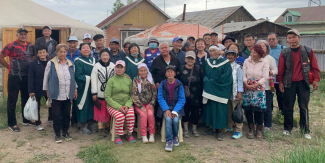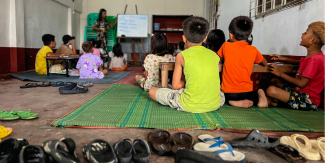Cash is something everyone likes to have on hand. When someone has cash, they have the freedom to choose how best to spend their money.

In the field of economics, this flexibility of cash being useful in a variety of ways is called fungibility, and it aids economic growth by providing a mechanism for a person selling a product or service to more easily find others with different products and services. Cash allows various parties to agree on fair and equal prices across products, time, and locations, something bartered goods cannot do. Cash fungibility also helps multiply economic efficiencies, or the transfer of goods with minimal waste, because the longer cash circulates within a community, the more people benefit. In other words, the more people are able to use cash to purchase as they choose, the healthier the local economy becomes.
Cash donations are growing in importance for those who engage in poverty alleviation. Previously, donors usually acquired goods (often in a country far away) and shipped those donations (at great financial expense and environmental impact) to economically impoverished places. The donor decided what was given, and the people receiving the aid had to accept the donations for what they were and figure out how best to use them. Sometimes, when donors were not aware, people would sell their donations (often at a significant loss from their real worth) to acquire the cash they needed and wanted for their most pressing needs. Today, cash donations, due to their fungibility, help shift the power for determining a household’s greatest need from the donor to the family who lives in poverty.
“Cash assistance given directly into households living in poverty immediately injects cash into a community.”
An additional benefit of cash assistance over traditional product donations is the substantial impact cash itself can have on local economies. In places of great need, economies suffer from a number of inefficiencies that hinder activities and transactions. Cash assistance given directly into households living in poverty immediately injects cash into a community. This infusion unleashes important economic exchanges.
Cash’s fungibility turns the donations into economic sparks, instantly multiplying people’s choices regarding who to trade and transact with that previously was unavailable. The increased cash flow within the community smooths economic transactions between people that, in turn, enhances further economic growth. Due to their economic power to spur a virtuous cycle in poorer communities, cash assistance is swiftly becoming an important part of poverty alleviation efforts.
Nazarene Compassionate Ministries is using cash grants to support people in need, including during the coronavirus (COVID-19) pandemic. For an example of a cash distribution relief project, watch this video highlighting an outreach in Malawi for survivors of Cyclone Idai.
Rob Gailey joined the Fermanian School of Business at Point Loma Nazarene University (PLNU) in 2005 and currently is a tenured Professor of Business there. Dr. Gailey serves as Director for PLNU’s Center for International Development (CID), and his experiences and work have revolved around ways to engage both the workplace and the church in helping to address global poverty through the avenue of sustainable organizations. He has served as an associate pastor, missionary, nonprofit leader, and educator around the areas of economic development, cross-cultural advocacy, and poverty alleviation. This past year, he has been on a sabbatical assisting Nazarene Compassionate Ministries on the Africa Region with nonprofit trainings and assessments throughout the region as well as working on a book on how to better engage churches in poverty alleviation efforts, which will include a section on cash distributions. Rob is married to Wanda and together they have two teenage children.






Add new comment